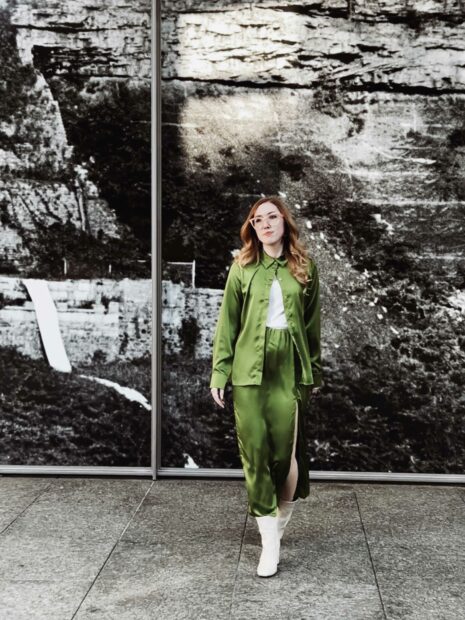This is the seventh in a series of interviews with regular Glasstire contributors. Not only does it seem right to show off the talent behind this magazine (because really, our writers keep us going), but this series provides an opportunity for you, our readers, to learn more about our writers and their other endeavors. Because our writers are all doing many, many great things.

Emma S. Ahmad
Ahmad and I have worked together almost my entire tenure at Glasstire, but it was at a coffee shop in Mexico City that I actually had a chance to sit down with her and learn more about her. As we sipped our coffee, Ahmad chatted with me about her job in visitor services at the Nasher Sculpture Center and about her ambition as an arts writer. Glasstire is lucky to have such a talented and sharp writer, and I am grateful to Ahmad for her drive and the passion she brings to each of her texts.
Leslie Moody Castro (LMC): Where do you live currently and where are you from?
Emma S. Ahmad (EA): I currently live in the DFW area, but I’m from all over Texas: San Marcos, Austin, San Antonio, College Station. We moved around. Though I tend to call San Antonio my hometown, since that is where my parents live now.
LMC: How has spending most of your life in Texas had an impact on how you see or experience art in other places? Do you see references or influences carry over from one place to another, and what makes Texas a great place to write about art?
EA: Texas (or the South in general) has such a dynamic social and cultural landscape, and for me, I see the influence of it in almost every aspect of American culture. It’s everywhere.
Texas has many huge cities with huge art economies, as well as rural counties that are producing incredibly diverse visual art. It is a stimulating place to make and showcase art because of the contrasts within the state, both politically and socially. Texas has such a big identity, but at the same time it’s constantly evolving and encompasses a really rich variety of people. And we are only growing. It’s a really exciting place to be right now.

Emma S. Ahmad
LMC: What is your favorite book?
EA: Such a hard question! I think my favorite book is Kitchen by Banana Yoshimoto. Or any book by her. She’s my favorite author and I own a copy of almost every book she’s written. Tomihiko Morimi and Haruki Murakami are some of my other favorite authors. I’m a big fan of Japanese fiction, if you can’t tell.
LMC: I’ve read Kitchen! One of my dearest friends (Roberta “Nina” Hassele in San Antonio) put it on my reading list, and Murakami is one of my favorite writers as well. What is your favorite thing to write about?
EA: I love writing about emerging artists and their work. It’s so exciting to catch someone at the beginning of their professional career and (hopefully) make an impact on it by giving them some well-deserved press.
LMC: Can you elaborate and tell us some stories/anecdotes about young artists you have talked with or written about?
EA: In general I am very fond of the artist/art writer relationship because I get to spend enough time with someone’s artwork to feel something profound and write about it, and in return they spend enough time reading my critique to be moved by it. It is intimate in its own way. Sometimes when I write about more established artists I don’t get the pleasure of having that exchange, but with young or emerging artists (some of whom are still in art school) I often talk to them before or after having written about their work and we get to establish that relationship.
LMC: What is your day job? What do you do outside of contributing to Glasstire and how, if at all, does that shape your perspective on art?
EA: My day job is working in the visitor experience department at the Nasher Sculpture Center, which is a great gig because I get to be around art all day! And I meet a lot of cool people from all over the world and get to talk about art with them. Being in that environment is really meaningful and inspiring, both on a personal level and for my writing.
LMC: Tell us more — how do you think it affects either your writing or the ways that you look and think about art?
EA: Well, since everyone perceives art so differently, the more I talk with people about art the more I expand my own understanding. Visitors in the museum will say things that make me think “wow… I never thought about it in that way before.” Sometimes that says a lot about the artwork and sometimes it says more about humans in general. Either way, it keeps my approach to thinking and writing about art in constant flux.
LMC: You have been working at the Nasher for a while, and I have seen your dedication to the arts and to writing. What are some of your bigger picture goals or aspirations as an arts practitioner and writer?
EA: Oh man. I’m the type of person who has never had a specific overarching goal or dream job, and I still feel that I’m figuring out my place in the art world, honestly. Broadly, I’d like to be a bigger part of my community and make a difference. I’d like to keep writing about art and supporting the arts because I think it’s immensely important and it brings me joy. My dad always tells me to “follow my bliss,” and I try my best to live by that philosophy and let things fall as they may.
